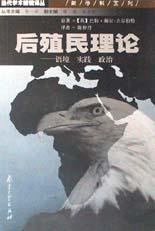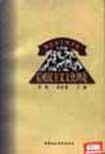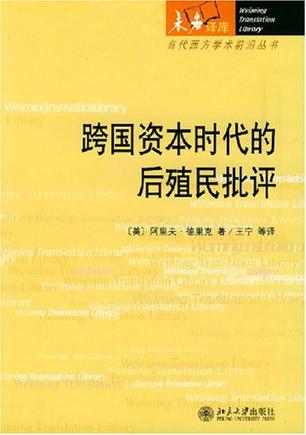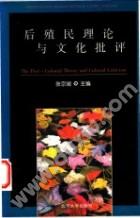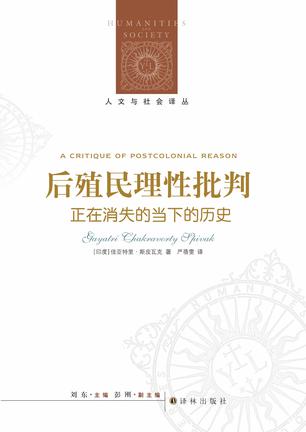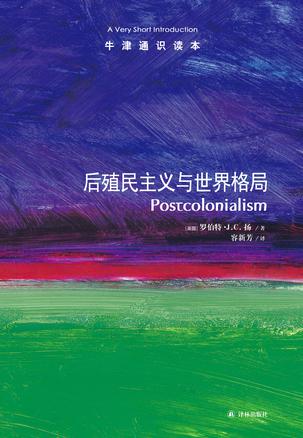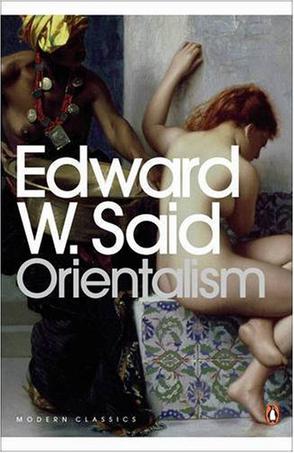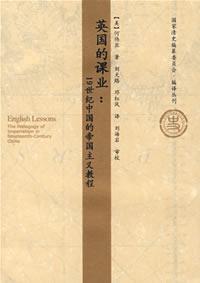欢迎来到相识电子书!
标签:后殖民主义
-
后殖民理论
近来围绕着文化分析后殖民模式的地位和价值有诸多争论。后殖民理论在几个方面受到挑战:在其跨学科的能力方面,其惯常定位的政治方面,以及其对其他类型后殖民分析内在的权力意愿,而这些分析许多都比后殖民理论本身出现的时间更早。随之而来的争辩常常是如此热烈甚至是个性化的。以致于这些被争辩的问题自身反而被模糊了。 在这部至今可说是对这一领域最全面明白的概览性著作中。巴特·穆尔-吉尔伯特系统地探讨了针对后殖民理论提出的反对意见,揭示了争论双方观点的单一和夸大之处。他详尽地提供了在历史上西方传统的研究文化与殖民关系方法的惯常做法,继之又探询了对这些问题另类形式后殖民分析的产生。他还从被称为欧洲中心论的观点到惑乱的散文风格各个方面,极为细心地介绍了后殖民理论三位主要代表人物(加亚特里·斯皮瓦克、爱德华·赛义德和霍米”巴巴)的复杂而费解的著作,并考虑到他们所遇到的批评。最后他虑及后殖民分析或许与各种压迫史相关的方向,考察这样一种混杂的理论是如何在文化非殖民化的连绵斗争中可以与联合和结盟的政治问题共容。 本书作者系统地探讨了针对后殖民理论提出的反对意见,揭示了争论双方观点的单一和夸大之处。他详尽地提供了在历史上西方传统的研究文化与殖民关系方法的惯常做法,继之又探询了对这些问题另类形式后殖民分析的产生。他还从被称为欧洲中心论的观点到惑乱的散文风格各个方面,极为细心地介绍了后殖民理论三位主要代表人物的复杂而费解的著作,并考虑到他们所遇到的批评。最后他虑及后殖民分析或许与各种压迫史相关的方向,考察这样一种混杂的理论是如何在文化非殖民化的连绵斗争中可以与联合和结盟的政治问题共容。 -
后殖民主义文化理论
后殖民主义文化理论是当今北美和欧洲方兴未艾的文化学术思潮,它基于欧洲殖民主义的历史事实以及这一事实所造成的种种后果而发展为一套理论话语。这套话语具有明确的政治取向性,同时又调和并利用了60年代以来的各种理论模型。本书精选了后殖民理论中最具影响和代表性的论文:包括赛义德著名的东方主义讨论,芭芭、斯皮瓦克等人后结构主义理论,法侬的文化抵抗及后殖民与女性主义、后现代主 -
跨国资本时代的后殖民批评
在当代欧美文化研究和理论批评界,德里克是一个有着广泛影响和理论建树的批评家,这不仅表现在他对当前一些重要的理论问题的提出者和建构者,还表现在他对现实问题的敏锐而活跃的解剖力。本书所收集的11篇论文,大都写于1991年至2000年,基本呈现了作者在急剧变动的时代对现实中出现的一些理论问题的思考。主要讨论以下三个方面的问题:一是后现代主义和后殖民主义提出一些论题,作者把其当作全球化的意识形态的产物和生产者;二是全球化问题,这是一个贯穿在本书中大多数论文中的主题,全球化作为一种范式也许是现代化在当代的一种替代物。另外,作者也讨论了本土和全球化的关系、“本土中的全球化”等问题;三是全球资本主义条件下的激进的政见形式:后革命和后社会主义等问题。这些问题的讨论具有较高的理论意义和现实意义。 -
后殖民理性批判
世界顶尖文学理论家斯皮瓦克,为后殖民研究领域奉献的第一部全面探讨之作。本书由哲学、文学、历史、文化四部分构成,涵盖20世纪90年代的全球化、后殖民和跨文化研究,是集后殖民、解构、马克思主义、女性主义等领域众多成果的重要著作。 后殖民主义理论的一位重要思想家审视这一领域的现状。在本书中,她将自己的批评视角转向了90年代的全球化、后殖民和跨文化研究。她的批评可分成四部分:哲学(对康德、黑格尔以及马克思的阅读),文学(重读吉普林、雪莱、库切,以及其他作家的作品),历史(对档案文献的思考,以及她对自己有关“殖民地人民能否言说”的一贯回答的修改与重写),文化(对全球纺织工业及其所体现出的矛盾的关注)。斯皮瓦克有力地质询了各种思想形态的实践、政治和托词,如先天论、精英后结构主义理论、大都市女权主义、文化马克思主义等。 -
后殖民主义与世界格局-牛津通识读本
《后殖民主义与世界格局》由当今国际后殖民主义研究大家罗伯特•J.C.扬撰写,在广阔的文化背景之下审视非殖民化的政治、社会和文化影响。清华大学外语系资深教授王宁作序推荐。 《后殖民主义与世界格局》内容新颖而活泼,与其他后殖民主义的简介大为不同。作者不是在谈抽象的理论,而是从世界局势、个人经历和史实评述入手来审视非殖民化的政治、社会和文化影响。他将讨论置于一个广阔的文化背景之下,所举例子涉及土著人、无地农民、阿尔及利亚的籁乐、后殖民女权主义以及全球性的社会和生态运动。 -
Orientalism
Said is best known for describing and critiquing "Orientalism", which he perceived as a constellation of false assumptions underlying Western attitudes toward the East. In Orientalism (1978), Said described the "subtle and persistent Eurocentric prejudice against Arabo-Islamic peoples and their culture."[12] He argued that a long tradition of false and romanticized images of Asia and the Middle East in Western culture had served as an implicit justification for Europe and America's colonial and imperial ambitions. Just as fiercely, he denounced the practice of Arab elites who internalized the American and British orientalists' ideas of Arabic culture. In 1980 Said criticized what he regarded as poor understanding of the Arab culture in the West: “ So far as the United States seems to be concerned, it is only a slight overstatement to say that Moslems and Arabs are essentially seen as either oil suppliers or potential terrorists. Very little of the detail, the human density, the passion of Arab-Moslem life has entered the awareness of even those people whose profession it is to report the Arab world. What we have instead is a series of crude, essentialized caricatures of the Islamic world presented in such a way as to make that world vulnerable to military aggression.[13] ” [edit] The argument Orientalism has had a significant impact on the fields of literary theory, cultural studies and human geography, and to a lesser extent on those of history and oriental studies. Taking his cue from the work of Jacques Derrida and Michel Foucault, and from earlier critics of western Orientalism such as A. L. Tibawi,[14] Anouar Abdel-Malek,[15] Maxime Rodinson,[16] and Richard William Southern,[17] Said argued that Western writings on the Orient, and the perceptions of the East purveyed in them, are suspect, and cannot be taken at face value. According to Said, the history of European colonial rule and political domination over the East distorts the writings of even the most knowledgeable, well-meaning and sympathetic Western ‘Orientalists’ (a term that he transformed into a pejorative): “ I doubt if it is controversial, for example, to say that an Englishman in India or Egypt in the later nineteenth century took an interest in those countries which was never far from their status in his mind as British colonies. To say this may seem quite different from saying that all academic knowledge about India and Egypt is somehow tinged and impressed with, violated by, the gross political fact – and yet that is what I am saying in this study of Orientalism. (Said, Orientalism 11) ” Said contended that Europe had dominated Asia politically so completely for so long that even the most outwardly objective Western texts on the East were permeated with a bias that even most Western scholars could not recognise. His contention was not only that the West has conquered the East politically but also that Western scholars have appropriated the exploration and interpretation of the Orient’s languages, history and culture for themselves. They have written Asia’s past and constructed its modern identities from a perspective that takes Europe as the norm, from which the "exotic", "inscrutable" Orient deviates. Said concludes that Western writings about the Orient depict it as an irrational, weak, feminised "Other", contrasted with the rational, strong, masculine West, a contrast he suggests derives from the need to create "difference" between West and East that can be attributed to immutable "essences" in the Oriental make-up. In 1978, when the book was first published, with memories of the Yom Kippur war and the OPEC crisis still fresh, Said argued that these attitudes still permeated the Western media and academia. After stating the central thesis, Orientalism consists mainly of supporting examples from Western texts. -
英国的课业
本书把中国嵌入到19世纪殖民主义的历史之中,指出帝国主义和殖民主义不仅仅是枪炮、商品和各种侵略行为,它还是一个文化过程,一个需要被征服人民自愿去接受的“霸权工程”。为了实现此目的,帝国主义在19世纪通过武力和政治压迫,对清政府和中国人民进行“规训”。“教育”他们在一个帝国主义支配的世界里,应该如何规范自己的行为。作者在这部著作中,运用后殖民研究的理论和方法,对鸦片战争到义和团起义时期的近代西方对华关系进行了全新的解读,把它从一段人所熟知的历史变成了一段令人感到新奇的崭新历史。 目 录 中译本序…………………………………………………………………………………何伟亚1 导 论 帝国主义、殖民主义与中同…………………………………………………………1 第一部分 鸦片战争与通商条约 第一章 亚罗号战争,1856~1860年…………………………………………………………33 第二章 中国的暴力与法治,1856-1858年 …………………………………………………52 第三章 北京,1860年:劫掠、奖赏金和神圣的报复………………………………………79 第二部分 在中国重建疆界,l861~1900年 导 语……………………………………………………………………………………………131 第四章 构建新秩序……………………………………………………………………………133 第五章 欧洲全球霸权时代的清帝国…………………………………………………………169 第三部分 使中国完全平等 导 语……………………………………………………………………………………………203 第六章 恐怖统治:北京及周围地区的惩罚与报复…………………………………………212 第七章 将清朝君主去神圣化,1900~1901年………………………………………………264 第八章 记忆手段:把西方铭记成受害者和英雄……………………………………………306 第九章 被压迫者的回报、再循环和中国爱国主义…………………………………………343 余 论……………………………………………………………………………………………378 参考文献…………………………………………………………………………………………383 西人姓名汉译表…………………………………………………………………………………427 译后记……………………………………………………………………………………刘天路439 -
Wide Sargasso Sea
在线阅读本书 Jean Rhys's late, literary masterpiece Wide Sargasso Sea was inspired by Charlotte Brontë's Jane Eyre, and is set in the lush, beguiling landscape of Jamaica in the 1830s. Born into an oppressive, colonialist society, Creole heiress Antoinette Cosway meets a young Englishman who is drawn to her innocent sensuality and beauty. After their marriage the rumours begin, poisoning her husband against her. Caught between his demands and her own precarious sense of belonging, Antoinette is driven towards madness.
热门标签
下载排行榜
- 1 梦的解析:最佳译本
- 2 李鸿章全传
- 3 淡定的智慧
- 4 心理操控术
- 5 哈佛口才课
- 6 俗世奇人
- 7 日瓦戈医生
- 8 笑死你的逻辑学
- 9 历史老师没教过的历史
- 10 1分钟和陌生人成为朋友

